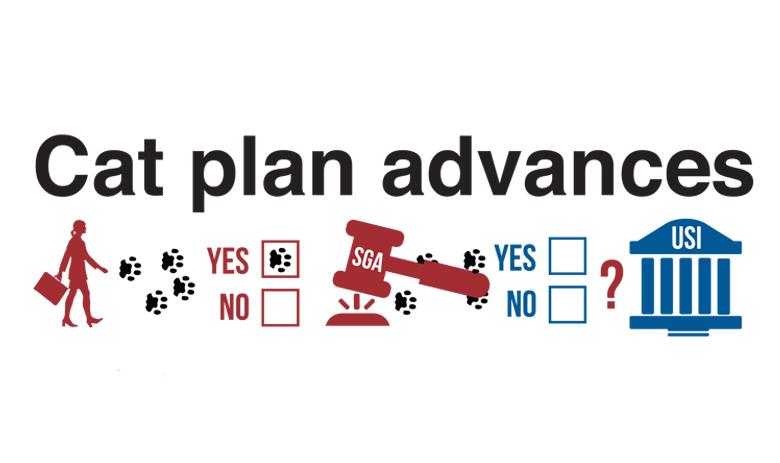The Student Government Association unanimously approved a symbolic resolution at its Feb. 20, meeting, which backs junior Audrey Maxwell’s proposed TNR (trap, neuter, return) policy.
Maxwell said administrators told her the change.org “Trap Neuter Return USI Feral Cat Population” petition she created and gained over 400 signatures on wasn’t enough. She needed “official” student support.
TNR is a method of trapping the cats, spaying or neutering them and returning them to the environment from which they were collected. Maxwell believes it would keep the stray cat population under control by stopping reproduction.
She presented facts to the General Assembly. Some representatives questioned alternatives, but admitted they didn’t know much about feral cats.
“I have to go back to administration with the symbolic resolution and present my case to them again,” Maxwell said after the meeting.
SGA Chief Justice Adam Brothers said a symbolic resolution is special because it means the resolution is supported by the entire student body.
“This shows massive support for this cause,” he said. “It does not guarantee anything with the administration, but it certainly will not hurt.”
He agreed actionable steps need to be taken to mitigate the issue.
“I am very happy that SGA and its members could play such a vital role in helping a student try to solve an issue on campus,” Brothers said. “This is a perfect example of how students can actually make a change on campus and how SGA is here to help.”
Aaron Gottman, SGA’s assistant Vice President for research and development, helped draft the resolution.
“The cat issue has been a constant problem on this campus for years,” Gottman said. “I noticed these cats last year as a freshman, and other students know about this issue.”
Gottman, who is also an active member in the Student Housing Association, said the problem was brought to his attention a few weeks ago. He wants the administration to know their students recognize a problem and want it resolved.
He said he cares about the issue beyond a professional standpoint, having taken care of animals all of his life.
“The fact of the matter is that students are scared – you can’t save a life like a little kitten without getting into trouble with the university,” Gottman said.
Maxwell will meet with Vice President for Finance and Administration Mark Rozewski and then, depending on how that meeting goes, Stephen Helfrich, facility operations and planning director, Marcia Kiessling, associate provost for student affairs, and Laurie Berry, housing a residence life director.
“When I originally went to (Steve) Helfrich, I think he planned on me being deterred by him saying that it wasn’t going to work,” Maxwell said. “There had been multiple students who had brought this up before and had been brushed off by the administration, so he was basically meeting with me to tell me, ‘No.'”
Maxwell said the administration in general doesn’t know much about TNR.
“If the student body thought it was a good idea – if the students were interested in it, then they would consider it,” Maxwell said. “But not beforehand.”
Twice a year, grounds workers set up box traps to catch and send cats to animal control, where they are likely euthanized
Maxwell hopes to start educating the USI community soon, she said.
“I hope they’ll say yes to me now and I can get this going before there’s more kittens on campus,” she said.
But she’s not so sure things will move that quickly.
“I think I’ll go through a lot of bureaucracy before I can get it done,” she said.
When asked if more pushback from the administration would stop her, Maxwell said, “Oh my gosh, no. I have so much support. So many people have come up to me saying that they tried to do this when they were students and they didn’t get anywhere. I’ve gotten the farthest – I feel like it’s my responsibility to finish this.”
Maxwell sought out nonprofits, which she said are writing her letters to present to administrators during meetings.
“The university has to accept some type of stewardship in this,” she said. “They have to protect their students and the cats that are living on their land. They can’t just ignore the problem.”
Maxwell said she doesn’t feel there’s any way the university can continue to say “no.”
“If I go through all of the steps they gave me, I would be going to the President and I would be going to the media,” she said. “There is no limit to the amount of publicity and the amount of support I can get for this cause because it really is the only statistical way you can humanely reduce a cat population.”
Maxwell’s goal is to get the policy changed before next winter.
She urges members of the community to do their own research in order to understand the benefits of TNR rather than relying on the university’s statistics.
Kiessling said Maxwell is taking the appropriate route.
“Student organizations represent the voice of the students,” she said. “I think she’s doing the right thing by going through the organizational system rather than around it.”
She said it’s good Maxwell has done her homework.
“I have no idea how this will turn out,” Kiessling said. “I think she’s doing what she should be doing to influence change.”



